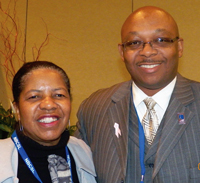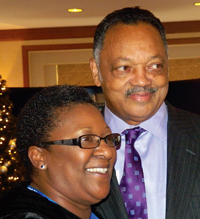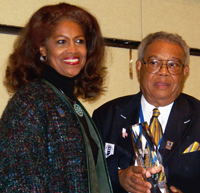
CHICAGO (FinalCall.com) – More than 350 Black elected officials representing 45 states, the District of Columbia and the U.S. Virgin Islands convened here for a four-day meeting of the National Black Caucus of State Legislators and to discuss critical issues facing states. They hope to influence the national legislative agenda by carving out priorities and programs from their respective capitols.
“We are on the frontlines in the battle to bring jobs and a better quality of life to our constituents. The issues we deal with are life and death, and this conference will provide a framework for national progress,” said Barbara Ballard, president of the Caucus. President Ballard, a member of the Kansas House of Representatives, added that state lawmakers have to be “warriors on behalf of the people they serve, ensuring that critically important issues for African Americans are part of the national dialogue.”
“Seeing Beyond–State Leadership, National Progress” was the theme of this year’s Dec. 7-11 conference in downtown Chicago and dealing with high unemployment rates was a top priority for participating state senators and representatives.

The Caucus advocates for policies it says would be effective on a state and national level. The group monitors the progress of national legislation and is vocal regarding which bills would lend the most help to their communities.
William Davis, state representative from the 30th District of Illinois, told The Final Call state legislators know they are an integral part of driving the national agenda. “This conference is an opportunity to test the waters on a number of related issues that then go on to the federal government, are presented to the White House as well as the Congress,” said Rep. Davis, who is also joint-chair of the Illinois Legislative Black Caucus. These ideas and policy issues are taken back to states to introduce legislation, monitor how ideas are or not received by voters, added Rep. Davis. Closed-door policy sessions during the meeting included discussions about information technology and The Affordable Healthcare Act, financing large-scale transportation projects, urban agriculture and tackling education disparities.
“If you talk to different legislatures in this room, you’ll find that in their respective states that that’s probably the number one thing right now is jobs. Even with the implementation of the Affordable (Health) Care Act, there’s a big component that lends itself towards jobs,” added Rep. Davis.
The AHCA, passed by the U.S. Congress in 2010 and signed into law by President Barack Obama, allocates $16 billion in grants to states to implement updated information technology to make medical records and information more “portable.”

Rep. Davis says there is a critical component to the act that can provide jobs. The information technology part of AHCA act creates a way for people to “shop” to find which insurance is best for them and their families.
“You’re going to need people to answer those phones, to be able to explain what their (healthcare) options are. That’s a big jobs piece that’s really not being very well put together right now so we’re working hard, trying to put everything in place at least in the Illinois legislature so that we can move that part of the Affordable Healthcare Act forward,” said Rep. Davis.
Barbara Cooper, state representative of Tennessee’s 86th District, was attending her 14th legislators conference. This has been one of the toughest years because of redistricting and voter I.D. laws implemented in her state. “Of course you know that Tennessee has Republican leadership now so they’re in charge of the redistricting and I’m apprehensive. Hopefully things will go well without going to the courts,” Rep. Cooper, a retired teacher of 43-years told The Final Call.
Rep. Cooper said protecting teachers is important but it was a huge blow when the Tennessee legislature voted back in May to end collective bargaining for public school teachers. Both houses are controlled by Republicans. “It is disheartening to see the things we are doing to our teachers,” said Rep. Cooper, who at 82-yearsold, shows no signs of slowing down. This makes the work the Caucus continues to do very important, she explained.
“This conference helps us to come together. When we share and come together, then it helps us to go back as renewed legislators in our community to share with our community and make our community better,” said Rep. Cooper.
Formed in 1977 with 14 members, the National Black Caucus of State Legislators is a way for Black state elected officials to exchange ideas and help formulate and shape policies. The group provides legislative training and serves as a unifying force for its members. The caucus currently has over 600 legislative members that represent 50 million people nationwide.












